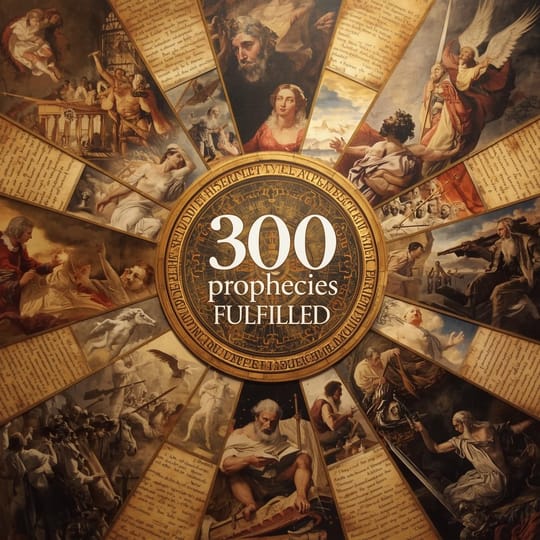Question: I prayed, but God didn't heal. Why?
Answer: This is a great question that comes down to understanding the Sovereignty of God, the definition of healing, dealing with incorrect doctrine, and trusting the Lord. Let's talk about it.
Few moments pierce the heart more deeply than standing at the bedside of someone you’ve prayed for—fervently, faithfully—and realizing that healing didn’t come the way you hoped. The question quietly echoes in the soul:
“Why didn’t God heal them?”
If that’s you today, grieving the loss of someone you begged God to save, please know this: your tears are seen (Psalm 56:8), your questions are heard (Psalm 34:17–18), and your pain is not wasted (Romans 8:28).
1. God Hears All of Our Prayers.
Sometimes it feels like unanswered prayer means unheard prayer—but Scripture says otherwise.
“The eyes of the Lord are on the righteous, and his ears are attentive to their cry.” — Psalm 34:15
Our prayers do not disappear into the ceiling. God heard every one of them. In fact, He invites them. He welcomes our pleading, our tears, and our faith. Prayer is not a transaction; it’s a relationship. You didn’t fail because the outcome wasn’t what you hoped. You were faithful to bring it before our Father, and He is faithful always to listen.
2. God’s Definition of Healing Is Bigger Than Ours.
When we pray for healing, we often mean physical restoration in this life. But God’s healing is eternal.
“He will wipe every tear from their eyes, and there will be no more death or sorrow or crying or pain.” — Revelation 21:4
For those who are in Christ, ultimate healing did happen—it just took place on the other side of eternity. The cancer didn’t win. The accident didn’t win. Death itself didn’t win.
When Jesus stood at Lazarus’s tomb, He wept—not because He didn’t know resurrection was coming, but because He felt the sting of human loss (John 11:35). God doesn’t stand far off from your pain; He enters it with you.
3. God’s Sovereignty Doesn’t Cancel His Compassion.
It’s easy to confuse “God’s will” with indifference, but Scripture reveals something different.
“The Lord is gracious and compassionate, slow to anger and rich in love.” — Psalm 145:8
God’s sovereignty means He sees the whole story. What looks like loss from our vantage point may, in His perfect wisdom, be the doorway to something we cannot yet see. We can’t always trace His hand, but we can trust His heart (Proverbs 3:5–6).
4. “But Didn’t God Promise to Give Us Whatever We Ask For?”
That’s an honest question—and one that many grieving hearts quietly struggle with. Jesus did say things like:
“You may ask me for anything in my name, and I will do it.” — John 14:14
“Ask and it will be given to you; seek and you will find.” — Matthew 7:7
At first glance, it seems like a blank check. But in context, Jesus was talking about prayer that aligns with His will and His character.
“This is the confidence we have in approaching God: that if we ask anything according to His will, He hears us.” — 1 John 5:14
God’s promises are not mechanical guarantees; they are relational invitations. He is not a genie obligated to fulfill our every desire but a loving Father who knows what is best for His children (Matthew 7:9–11).
When we pray “in Jesus’ name,” it’s not a magic phrase—it means praying in harmony with His nature, His purposes, and His perfect wisdom. And sometimes, in His mercy, that means saying no to our immediate request because He’s saying yes to something greater—something eternal.
Even Jesus Himself prayed,
“Father, if you are willing, take this cup from me; yet not my will, but yours be done.” — Luke 22:42
If the Son of God could pray for deliverance and still submit to the Father’s higher plan, it reminds us that unanswered prayer doesn’t mean abandoned prayer. It means God is doing something deeper than what we can see.
5. It’s Okay to Grieve and Still Trust the Lord.
Jesus Himself said,
“Blessed are those who mourn, for they will be comforted.” — Matthew 5:4
Grief and faith are not opposed to one another. You can cry and still believe. You can feel anger, confusion, and deep sadness while still trusting God’s goodness. Faith is not pretending everything is fine—it’s clinging to God when nothing makes sense.
David modeled this kind of faith-filled grief:
“How long, Lord? Will you forget me forever? … But I trust in your unfailing love; my heart rejoices in your salvation.”
— Psalm 13:1, 5
Even in his questions, David returned to trust.
6. God Will Bring Beauty from Brokenness.
It might not happen overnight, but God has a history of redeeming heartbreak.
“To all who mourn… he will give a crown of beauty for ashes, a joyous blessing instead of mourning, festive praise instead of despair.” — Isaiah 61:3
He specializes in turning graves into gardens. What you’re walking through can one day become the very place you comfort others with the same comfort you’ve received (2 Corinthians 1:3–4).
Next Steps for when Grieving.
1- Talk to God honestly.
He can handle your pain, your anger, and your questions. (Psalm 62:8)
2- Surround yourself with community.
Don’t isolate. Let others carry you when you can’t carry yourself. (Galatians 6:2)
3- Remember your loved one with gratitude.
Make a list of memories and moments that remind you of God’s grace. (Philippians 4:8)
4- Keep your eyes on eternity.
This separation is temporary. If your loved one knew Christ, they are home—and you will see them again. (1 Thessalonians 4:13–18)
5- Serve someone else who’s hurting.
Healing often begins when we help others in their pain. (2 Corinthians 1:3–4)
Bottom Line
When healing doesn't come the way we prayed and hoped, we can still trust that the resurrection is coming. Every grave that belongs to Jesus is temporary. Every tear will be wiped away.
“I am the resurrection and the life. Anyone who believes in me will live, even after dying.” — John 11:25
The story isn’t over. The same Jesus who conquered death will one day make all things new—including your broken heart.
Further Reading
- Psalm 34: “The Lord is close to the brokenhearted.”
- John 11: Jesus and the death of Lazarus.
- 1 John 5:14–15: Praying according to His will.
- Revelation 21: The promise of eternal healing.
- 2 Corinthians 4:16–18: “Our present troubles are small and won’t last very long…”









